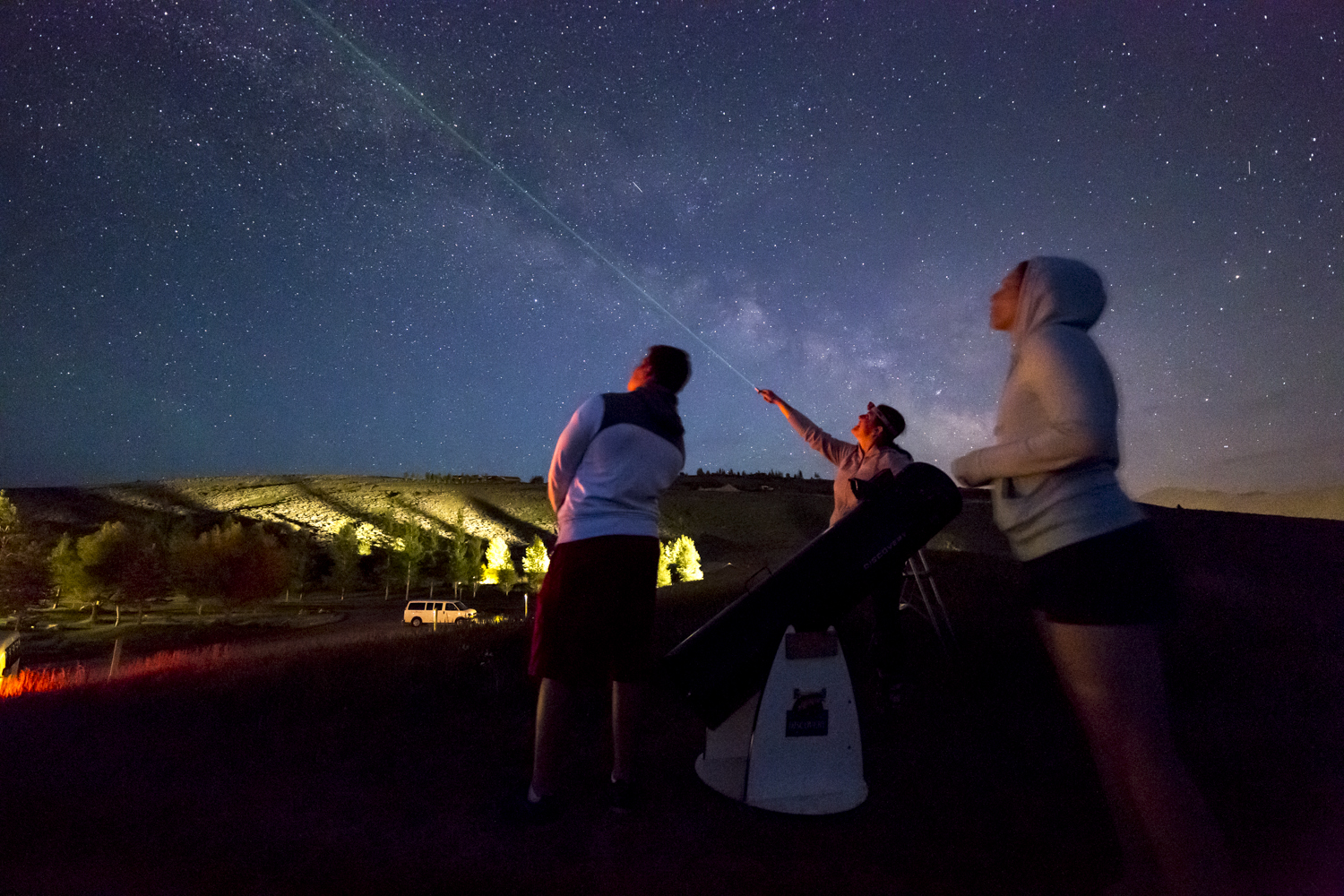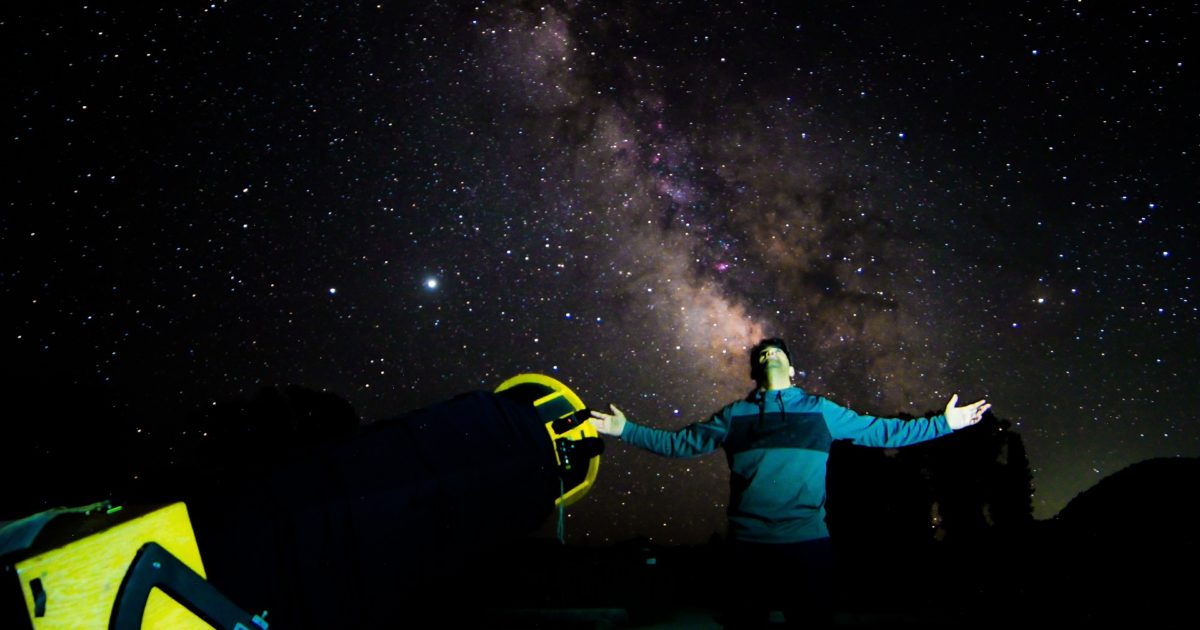
Night Skies in Jackson Hole: Out-of-This-World Beautiful
By Kate Ready
Here in Jackson Hole, we’re working to educate visitors on respecting one of our most enchanting resources: our night sky.
It’s an exciting time for Jackson — we’re on our way to becoming a Certified International Dark Sky Community. Hint: There aren’t too many of them.
So we wanted to shed light (haha) on the Save Our Night Skies campaign, spearheaded by one of our incredible partners, Wyoming Stargazing.
We spoke with Dr. Samuel Singer, the executive director of Wyoming Stargazing, about what light pollution is and how it adversely impacts communities and wildlife.
Read on to learn where that saying “deer in the headlights” comes from and easy (free) tips from Samuel on how to keep our skies wild for the next generation.
The best part? The tips are so easy, fast and free.
Q: What is light pollution and why should we care?
A: Light pollution is the presence of artificial light in dark conditions. So think streetlights at night, exterior building lighting and even the lights on your car. It’s become a problem in Jackson Hole for the health and safety of people and wildlife, not to mention the wasted money and energy associated with unnecessary artificial light.
In downtown Jackson, our view of the Milky Way Galaxy is very close to being lost.
In terms of people, there is really good data from the National Institutes of Health, the World Health Organization and others about how artificial light at night has deleterious effects on human health including insomnia, hormone production and various forms of cancer. The blue wavelengths of light we get from our electronic devices and our lights at night mess with our circadian rhythms and suppress melatonin.
For wildlife, light pollution at night also interferes with their natural circadian rhythms. We see a big effect on birds. The Audubon Society estimates about a billion birds are killed per year due to outside lights. A lot of birds use moonlight for navigation which can affect migratory patterns. Insects also die by the billions. It’s a big problem for predators of insects because they’re a primary source of food for bats, birds and others.
You’ve probably heard that old adage “a deer stuck in headlights.” Well, the reason they get stuck is they lose their depth perception when bright light is exposed to their eyes at night. The number of animals that get killed on roadsides is staggering.
In downtown Jackson, our view of the Milky Way Galaxy is very close to being lost.
Energy-wise, a lot of money and energy gets wasted every year. Three billion dollars is lost every year to sky glow and 35% of light is wasted from unshielded or poorly shielded outdoor lighting.

Q: What is the Save Our Night Skies campaign?
A: The campaign is about raising awareness about light pollution and mitigating its negative effects on people, wildlife, unnecessary costs, energy use, and of course the decreased beauty of the night sky. People just don’t know they’re causing harm. We’re trying to help the Town of Jackson and Grand Teton National Park achieve Dark Sky Certification from the International Dark Sky Association.
We’re probably about two years out from achieving that Dark Sky Community certification for Jackson, Teton County and Grand Teton National Park.
Q: What can visitors do?
A: Close the blinds in your hotel rooms after dark so light doesn’t flood out into the sky. If 30,000 people can do that, it’s huge.
If you rent airbnbs or other private homes outside of town, turn off the outside lights at night.
The biggest thing is about shielding light: Direct bulbs down toward the ground where it’s needed.
As the National Park says, “Half the park is after dark.” If we don’t apply the same conservation principles above our heads as we do to the land itself, we will lose those night skies.
If you’re visiting us on July 30th, we’re going to hold our second annual “Lights Out, Jackson Hole” event at the Stilson Parking Lot/Transit Center in Wilson, starting at 10 p.m. We challenge people to turn off as many exterior and interior lights as possible. We pick a one-hour period to turn off all the lights. Last year, it was the darkest I’ve ever seen it.
Q: How can visitors protect their night skies at home?
A: Shield your outdoor lights and point them down at the ground.
Also, consider using a warmer-appearing light instead of white. At the same wattage, a white light can contribute up to eight times the amount of light pollution of a warmer, orange-looking light. Warmer-looking lights also have less impact on wildlife and even help you sleep better at night. They’ll also help your eyes adjust better to the darkness, allowing for more visibility in the shadows, and also up into the night sky. Imagine being able to see the Andromeda Galaxy from your backyard!
Take a look at the International Dark Sky Association’s Dark Sky Friendly Lighting page to help you get started and you too can easily help us save our night skies.
The Last Word, From Jackson Hole Traveler:
Sure, a Jackson Hole logo sweatshirt is cool, but we at Jackson Hole Traveler like our souvenirs in the form of sustainability tips and lifelong memories.
So when you see your first shooting star here in Jackson Hole, we ask you to take these steps to protect those awe-inspiring moments for the next generation. And who knows, maybe you’ll help us start a trend of certifying Dark Sky communities all over the country.
As locals, we thank you for working together with us to restore our night skies.
For more information on Wyoming Stargazing and the “Save Our Night Skies” initiative, please visit wyomingstargazing.org
Kate Ready is a freelance writer for Jackson Hole Traveler and an enthusiastic resident of Jackson. Curious and passionate for storytelling in all its forms, in her free time you can find her reporting for the Jackson Hole News & Guide or drooling over Steinbeck.
